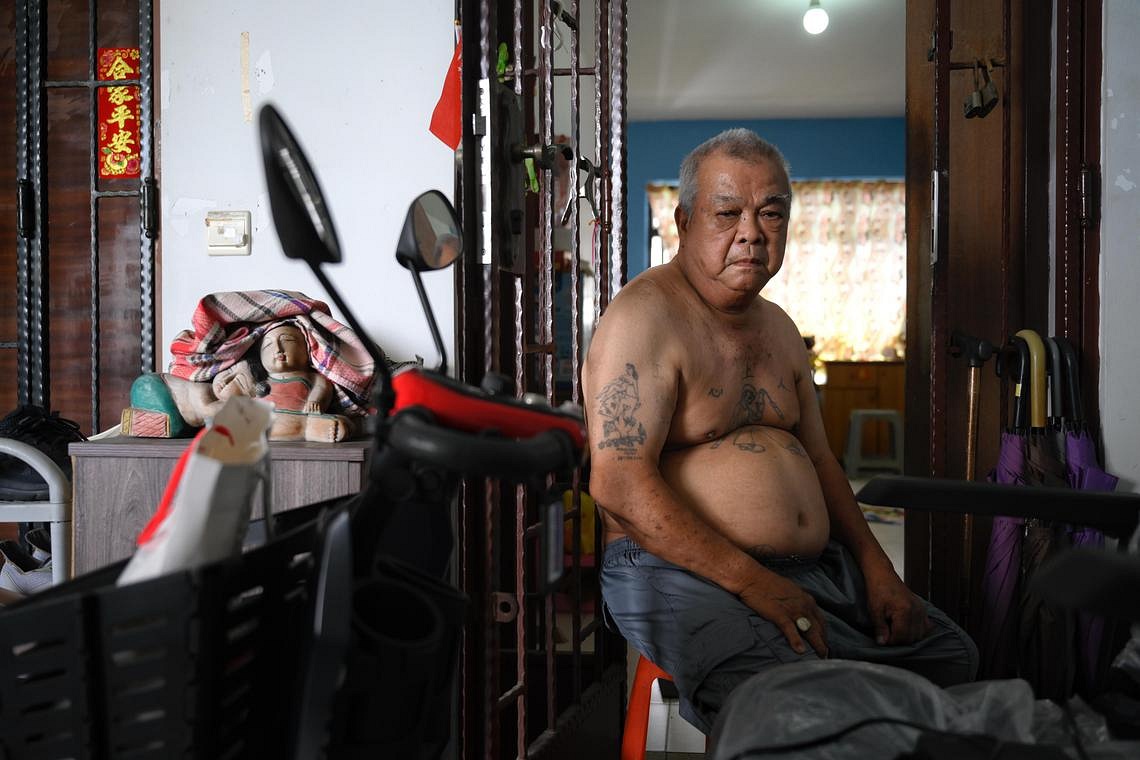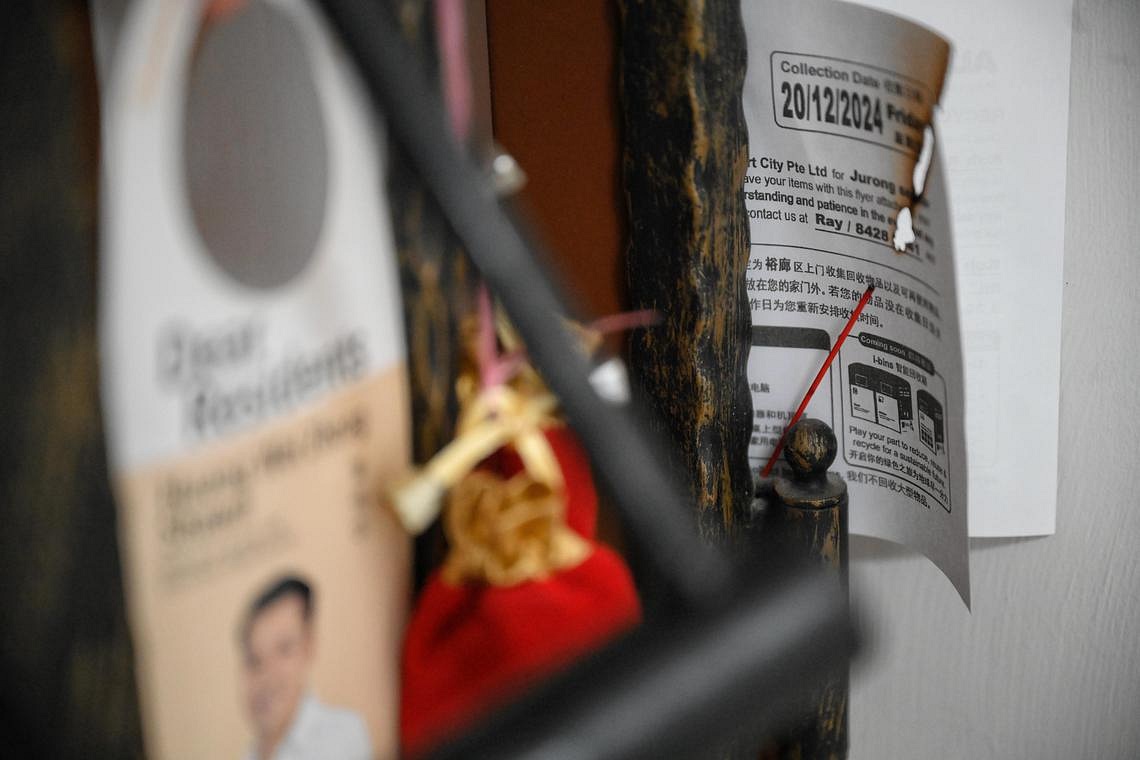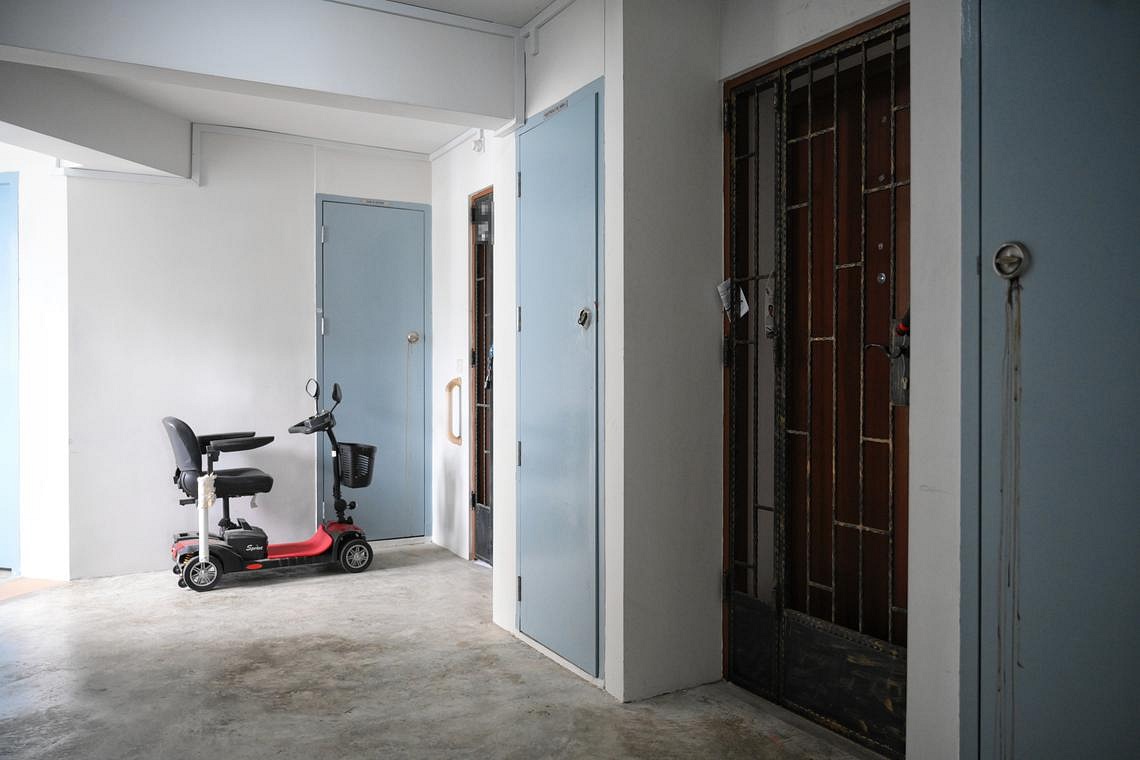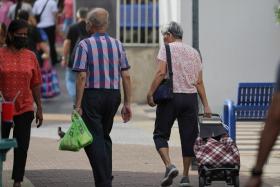Elderly couple found dead together in their Jurong flat
Around two weeks before Christmas, Jurong resident Lim Chwee Guan noticed a strange smell wafting along the corridor of his 18th floor Housing Board unit.
After three days, the 78-year-old retiree alerted the police when he suspected something tragic had happened.
A number of residents who live in Block 338B Kang Ching Road, near Lakeside MRT, are senior citizens.
His fears came true on Dec 15, 2024, when police discovered the decomposing bodies of an elderly couple who lived on the 18th floor. They had died of natural causes.
While there have been reports of seniors dying alone in their flat, trauma cleaner Rahman Razali, of DDQ Services, said the Kang Ching Road incident was unusual.
His company is one of three firms in Singapore that are engaged by town councils to clean up a flat after such cases.
Said Mr Rahman: “My company attends between two and three cases every week involving seniors dying alone at home.
“But it is very rare to hear of two people dying together like this. I have only encountered one or two such cases after 10 years in this line of work.”
There was a similar incident in 2022, when a 70-year-old man and his 92-year-old mother were found dead in their Tampines Street 22 flat.
Residents of Block 338B Kang Ching Road knew the couple as Mr Lim Eng Keong, 71, and Madam Mary Ong, 67.
Mr Lim Chwee Guan, who lived directly opposite the couple, told The Straits Times in Mandarin: “I had not seen them for three days, so I thought they could have been hospitalised.

“But when the smell grew stronger, I knew something was wrong.”
He said Mr Lim Eng Keong had several chronic ailments, and Madam Ong relied on a wheelchair to move around. She was dependent on her husband for most of her needs.
Mr Billy Ng, who lives alone on the 19th floor, said he last saw Mr Lim Eng Keong about three weeks before Christmas.
“He used to visit me at least once a week. I asked the neighbours but nobody seemed to know what happened,” the 84-year-old retiree said.

The Straits Times approached Thye Hua Kwan Moral Charities, which operates an active ageing centre at a nearby block in Taman Jurong, about programmes for senior citizens in the estate.
It declined comment.
Mr Lim Chwee Guan and Mr Ng said Mr Lim Eng Keong had diabetes. They recalled that before the tragedy, one of his legs was swollen and looked darker.
Neighbours said the couple rarely had visitors, but some people did turn up at a wake held in Sin Ming Drive on Jan 6 to pay their respects.

Mr Shawn Huang, MP for Jurong Spring ward in Jurong GRC, said Mr Lim Eng Keong and Madam Ong were jovial, loving, and well-integrated in the community.
He added that they took part in activities organised by the Active Ageing Centre in the estate. The recreational centre extends support to seniors living in the community.
“I have met them during house visits. In fact, I met both of them just a few weeks before they passed. It is always difficult news,” he added.
Dying alone
The Ministry of Health does not track the number of elderly who die alone at home, but the Health Sciences Authority reportedly handles fewer than 100 unclaimed bodies each year.
Trauma cleaning company One Heart Cleaning said it has been receiving more calls for its services.
The company’s project manager, Ms Felicia Mak, said the firm can get up to three calls a week to perform deep cleaning when seniors die alone at home.
The calls can come from relatives, town councils and the police.
“We receive inquiries but sometimes they decide not to engage our services. This can be because of pricing or our availability, as these cases are usually very abrupt,” said Ms Mak.
Cheng Hong Welfare Service Society (CHWSS) chairman Kenny Sim said his organisation attended to 270 cases of lonely deaths across 2024, compared with 190 cases in 2023.
The organisation had established a free afterlife memorial service in 2012 to help seniors prepare their last rites.
Mr Sim said 108 out of the 270 seniors who died alone had signed up as members in 2024.
The charity accepts members who meet certain requirements such as being 65 and above, or those who have financial difficulties and are living in rental HDB flats.
“We get these members through our outreach efforts, which could involve knocking door to door to speak to these seniors.
“We want to let them know that we are here to help and that they are not alone,” said Mr Sim.
They also receive referrals from medical social workers in hospitals, old folk’s homes and hospices, he added.
CHWSS’s 500 volunteers currently look after 2,500 seniors islandwide. The organisation is aiming to reach 3,000 seniors by the end of 2025.
Social service agency Lions Befrienders said it leverages technology to ensure it can reach more lonely seniors.
Ms Karen Wee, executive director of the organisation, said: “We have been using technology, such as motion sensors, inside the homes that will alert us of movement. We also have apps that seniors can use to give us regular check-ins so we know they are there.”
This is all done to give the seniors a dignified send-off, she said.
“We need to assure them that they will not die a lonely and undignified death. Of course, there will be cases where the death occurs very suddenly but even then, we aim to find their bodies within 24 hours,” Ms Wee added.
The organisation’s 150-member team served 13,000 seniors in 2024. It is aiming to assist 27,000 seniors by 2030.
Mr Andy Ang, head of Touch Active Ageing, said that while organisations can try to engage seniors, some people prefer to be left alone.
“It is challenging when seniors refuse help, even when there are major issues that need to be promptly addressed,” he said.
“Isolated frail seniors suffering from dementia or cognitive impairment, health or mental health issues are the hardest to reach out to.”
He said the organisation’s staff and volunteers would still visit the seniors regularly, to persuade them to accept their help.
Living alone
Government figures showed that there were 79,000 residents aged 65 and above in Singapore living alone in 2022, a number likely to grow with one in four citizens reaching 65 or older by 2030.
Older housing estates such as Bukit Merah, Ang Mo Kio, Hougang and Toa Payoh have relatively larger elderly populations.
Mr Huang, who is Senior Parliamentary Secretary for Education and Finance, said the issue of seniors living alone is one that is close to his heart.
“In Jurong, we believe in creating as many opportunities for interaction among seniors,” he said, adding that these include strengthening and expanding their social circle, promoting communal activities among neighbours and new friends in the community.
He also advocates a culture of self-initiated activities, which could be as simple as going for a coffee or exercising together.
“We have to curate programmes that will create an environment for seniors to thrive and lead fulfilling lives. And make meaningful relationships new or old.
“The best start is to have strong and expanding networks and relationships.” he added.
The Government has been ramping up programmes to prepare for a “super-aged” society, when 21 per cent of the population is aged 65 or above. Singapore is expected to attain the status in 2026.
Healthier SG, launched in July 2023, is focused on major preventive care – where individuals are encouraged to work with a general practitioner to take charge of their health.
The programme will complement Age Well SG, a $3.5 billion national drive by the Ministry of Health, Ministry of National Development and Ministry of Transport to support seniors in ageing well in their homes and their communities.
Mr Lim Chwee Guan said his neighbours in Kang Ching Road, where he has lived for nearly two decades, have always looked out for one another.
He added that it was tragic that Mr Lim Eng Keong, who often stopped to check on residents, died that way.
“He was a very nice man. He would always go out during the day to buy snacks like curry puffs and give them to me,” said Mr Lim Chwee Guan.
When ST visited the couple’s unit on Jan 7, there were joss sticks placed on both sides of the gate.
Mr Lim Chwee Guan said it was his way of saying farewell to the couple, who were Buddhists.
“When I found out they had died inside, I went to buy some vegetarian food to offer to them and also pray for them as I considered him my friend.”
He added: “At the end of the day I’m also in the same position as them. I am here alone and I do not know when I will die.”
Get The New Paper on your phone with the free TNP app. Download from the Apple App Store or Google Play Store now

